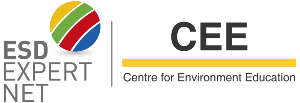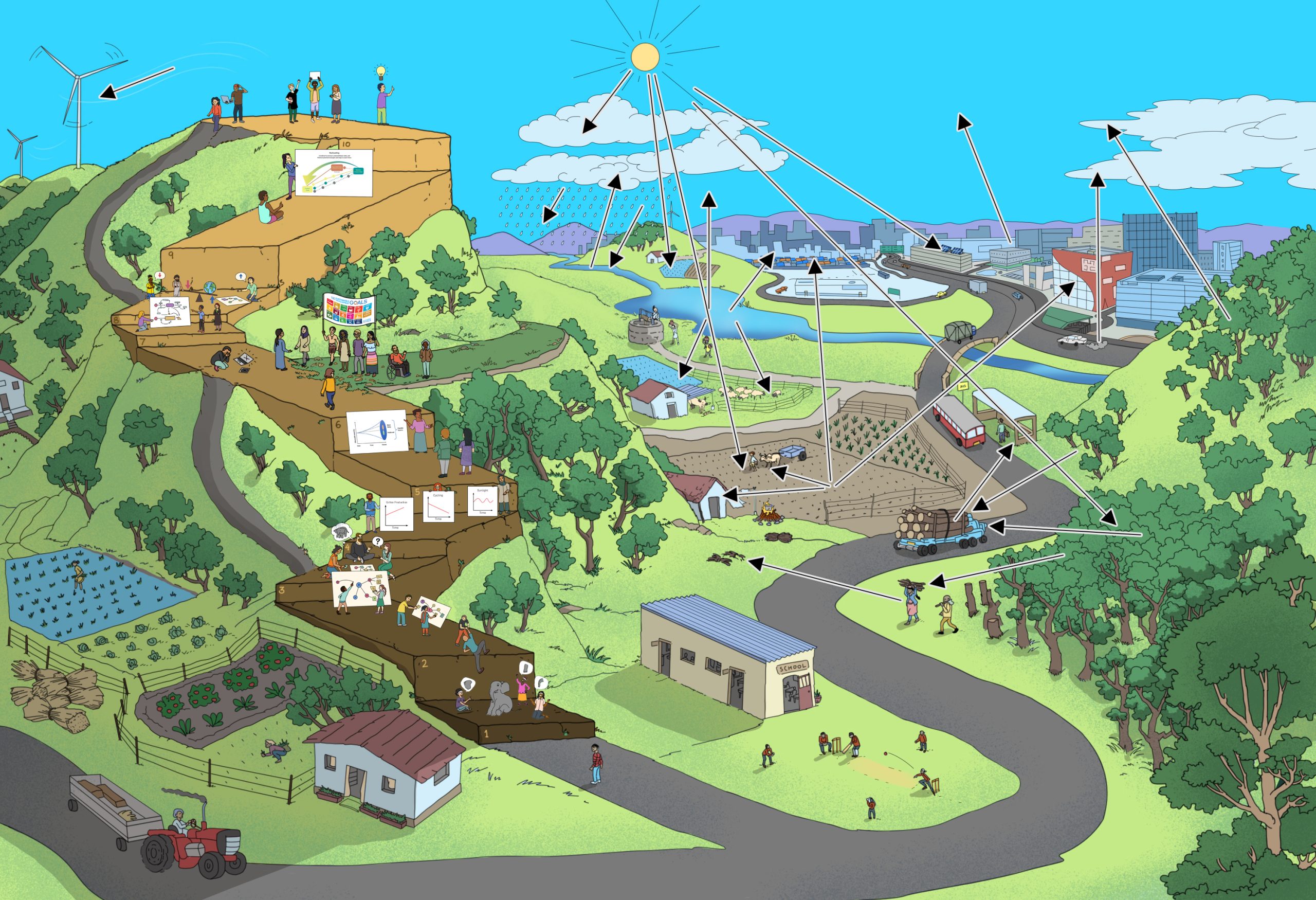Glossary
2030 Agenda For Sustainable Development
Contains the 17 Sustainable Development Goals (SDGs) with 169 targets which were framed and unanimously adopted by the 193 member states of the United Nations on 25th September 2015.
Anticipatory Competence
The abilities to understand and evaluate multiple futures – possible, probable, and desirable; to create one’s own visions for the future; to apply the precautionary principle; to assess the consequences of actions; and to deal with risks and changes.
Balancing Behaviour/loops
Along with reinforcing loops, it forms the two building blocks of dynamic systems. Balancing processes seek equilibrium — they try to bring things to a desired state and keep them there. They also limit and constrain. A balancing loop depicts a balancing process. Also called negative loop.
The Systems Thinker – The Vocabulary of Systems Thinking: A Pocket Guide – The Systems Thinker
Behaviour Of The system
The behaviour of a system are the expected changes over time, as long as it is allowed to function normally. For example, the seasons are a normal behaviour of the climate system
The Systems Thinker – The Vocabulary of Systems Thinking: A Pocket Guide – The Systems Thinker
Collaboration Competence
The abilities to learn from others; to understand and respect the needs, perspectives, and actions of others (empathy); to understand, relate to and be sensitive to others (empathic leadership); to deal with conflicts in a group; and to facilitate collaborative and participatory problem solving.
Competence
Competences are specific attributes that individuals need for action and self-organization in various complex contexts and situations. They include cognitive, affective, volitional, and motivational elements. Hence, they are an interplay of knowledge, capacities and skills, motives, and affective dispositions. The different competences cannot be taught but have to be developed by the learners themselves. They are acquired during action, on the basis of experience and reflection. (Weinert, F. E. (2001). Concept of competence: A conceptual clarification. In D. S. Rychen & L. H. Salganik (Eds.), Defining and selecting key competencies (pp. 45–65). Hogrefe & Huber Publishers.)
Critical Thinking Competence
The ability to question norms, practices, and opinions; to reflect on own one’s values, perceptions and actions; and to take a position in the sustainability discourse.
https://www.unesco.de/sites/default/files/2018-08/unesco_education_for_sustainable_development_goals.pdf
Ecological Footprint
A measure of the pressure that humans exert on the planet. It is expressed in global hectares (gha), or by number of planets, and it allows us to estimate the land surface needed by each individual to provide for their needs.
https://climate.selectra.com/en/environment/ecological-footprint
Education For Sustainable Development (ESD)
ESD generally focusses on the development and strengthening of individual competencies, enabling the individual to contribute to and participate in sustainable development processes of various kinds and dimensions. From that definition it is obvious that all types of competencies and skills including basic competencies such as reading, writing, numeracy are included. Higher level competencies such as creativity, solution-oriented thinking and actionability are fundamental for ESD, since without them it would not be possible to find ways, concepts, techniques, which make us succeed to reach the space of sustainability. (Siege, Hannes/Hoffmann, Thomas: What is ESD?
https://esd-expert.net/teaching-and-learning-materials.html
Feedback loops
The return of information about the status of a process. For example, annual performance reviews are a way of returning information to an employee about the status of his/her work
The Systems Thinker – The Vocabulary of Systems Thinking: A Pocket Guide – The Systems Thinker
Flow
The amount of change something undergoes during a particular unit of time. For example, the amount of water that flows out of a tub each minute, or the amount of interest earned in a savings account each month.
The Systems Thinker – The Vocabulary of Systems Thinking: A Pocket Guide – The Systems Thinker
Global (Production) System
The potato chip example navigates the journey from the potato field to the bag of chips in our hands as part of a global production system:
Global Citizenship Education
GCED is a concept which explains how students can be equipped with knowledge, social skills, values, and attitude to better understand the world and its complexities, to gain values, attitudes and social skills which help them to develop affectively, psychosocially and physically, to enable them to live together with others respectfully and peacefully and to contribute actively to a better world.
https://en.unesco.org/themes/gced/definition
Gross Domestic Product (GDP)
Gross domestic product (GDP) is the total monetary or market value of all the finished goods and services produced within a country’s borders in a specific time period. As a broad measure of overall domestic production, it functions as a comprehensive scorecard of a given country’s economic health.
https://en.wikipedia.org/wiki/Gross_domestic_product
Handprint
The Handprint signifies positive action and commitment. It serves as a measure of human contribution to sustainability at the individual, community, national and global level just as the footprint is a measure of unsustainable human action. (CEE, Handprint CARE)
Human Development Index (HDI)
A statistic composite index of life expectancy, education (mean years of schooling completed and expected years of schooling upon entering the education system), and per capita income indicators, which are used to rank countries into four tiers of human development. A country scores a higher HDI when the lifespan is higher, the education level is higher, and the gross national income GNI (PPP) per capita is higher.
https://en.wikipedia.org/wiki/Human_Development_Index
Interrelationships And Causation
The language of systems thinking is circular rather than linear. It focuses on closed interdependencies, where x influences y, y influences z, and z influences x.
The Systems Thinker – The Vocabulary of Systems Thinking: A Pocket Guide – The Systems Thinker
Integrated Problem-Solving Competence
The overarching ability to apply different problem-solving frameworks to complex sustainability problems and develop viable, inclusive, and equitable solution options that promote sustainable development, integrating the above-mentioned competences.
https://www.unesco.de/sites/default/files/2018-08/unesco_education_for_sustainable_development_goals.pdf/
Leverage Point
Leverage points are places in a system where, “a small shift in one thing can produce big changes in everything” (Meadows, 1999). In human-made systems, leverage is about the efficiency and efficacy of interventions for changing the systems in accordance with desired goals. A leverage point is the place in the system structure where the intervention is made.In the physical world, ‘leverage’ occurs when an input of force into a system generates a greater output force. Leverage is about relative efficiency and efficacy of possible interventions. A ‘leverage point’ within a system is that point where you place your ‘lever’ to cause the maximum intended impact, with a minimum of input, such as efforts or funds
The Systems Thinker – The Vocabulary of Systems Thinking: A Pocket Guide – The Systems Thinker
Transformative learning
Transformative learning is the idea that learners who are getting new information are also evaluating their past ideas and understanding and are shifting their very worldview as they obtain new information and through critical reflection. It goes beyond simply acquiring knowledge, and dives into the way that learners find meaning in their lives and understanding. This kind of learning experience involves a fundamental change in our perceptions—learners start to question all the things they knew or thought before and examine things from new perspectives to make room for new insights and information.
Normative Competence
The abilities to understand and reflect on the norms and values that underlie one’s actions; and to negotiate sustainability values, principles, goals, and targets, in a context of conflicts of interests and trade-offs, uncertain knowledge and contradictions.
Recognizing, Evaluating And Acting
The ´Ten Steps towards Systems Thinking´ are arranged along the dimensions Recognizing, Evaluating, and Acting (UNESCO, 2017, p. 91 and Schreiber/Siege, 2016, p.95). The steps begin with simple description of reality (recognizing), leading to progressive, comprehensive, and deeper analytic understanding (assessing/evaluating), and therefore preparation to act more strategically (acting).
Reinforcing Behavior/loops
Along with balancing loops, it forms the two building blocks of dynamic systems. Reinforcing processes produce both growth and collapse — they compound change in one direction with even more change. A reinforcing loop depicts a reinforcing process. Also known as vicious cycles or virtuous cycles and positive feedback loops.
The Systems Thinker – The Vocabulary of Systems Thinking: A Pocket Guide – The Systems Thinker
SDGs/ UN Sustainable Development Goals
Are the heart of the 2030-Agenda which aims to ensure that all human beings can lead a life in dignity within the means of this one planet.
They represent a systemic, problem-solving, future- and action-oriented approach to social change towards a more sustainable world that is applicable to both developed and the developing countries.
Self-Awareness Competence:
The ability to reflect on one’s own role in the local community and (global) society; to continually evaluate and further motivate one’s actions; and to deal with one’s feelings and desires.
Strategic Competence
The abilities to collectively develop and implement innovative actions that further sustainability at the local level and further afield.
Stock
The abilities to understand and reflect on the norms and values that underlie one’s actions; and to negotiate sustainability values, principles, goals, and targets, in a context of conflicts of interests and trade-offs, uncertain knowledge and contradictions.
https://thesystemsthinker.com/the-vocabulary-of-systems-thinking-a-pocket-guide/
Sustainable Development
Sustainable development describes the process of individuals and/or social groups to achieve sustainability. Or, to use the same metaphor in the context of the interplay of HDI and ecologic footprint, sustainable development is the path leading into the green corner of the model – from wherever an individual, social group or whole nation started. (Siege, Hannes/Hoffmann, Thomas: What is ESD?
https://esd-expert.net/teaching-and-learning-materials.html
System Boundaries/ Boundary
A system is an interconnected set of elements that is coherently organized in a way that achieves something. A system is a system when it consists of the following: elements, interconnections, and a function or purpose. Systems show typical behaviours or patterns of change such as causal or feedback loops, growth, or decay (reinforcing) in linear or exponential manner, or oscillations, or stabilising (balancing) behaviour.
The Systems Thinker – The Vocabulary of Systems Thinking: A Pocket Guide – The Systems Thinker
Systems Models
A model is a simplified picture or depiction of a part of reality. The aim of (scientific) modelling is to clarify and organize one’s own thinking and make it shareable and communicable to others.
The Systems Thinker – The Vocabulary of Systems Thinking: A Pocket Guide – The Systems Thinker
Systems Thinking Competence
The abilities to recognize and understand relationships; to analyse complex systems; to think of how systems are embedded within different domains and different scales; and to deal with uncertainty.
Systems Thinking For Sustainable Development
Is the ability to describe and/ or visualise a part of a complex reality, express that part of reality as a model, understand the model as a system, use the model to explain the behaviour of the system, anticipate the behaviour of the system, and evaluate its impacts on sustainable development, identify potential points of, and types of interventions, generate options to act, assess their impacts in the frame of sustainable development, and decide whether further actions are necessary or not.

